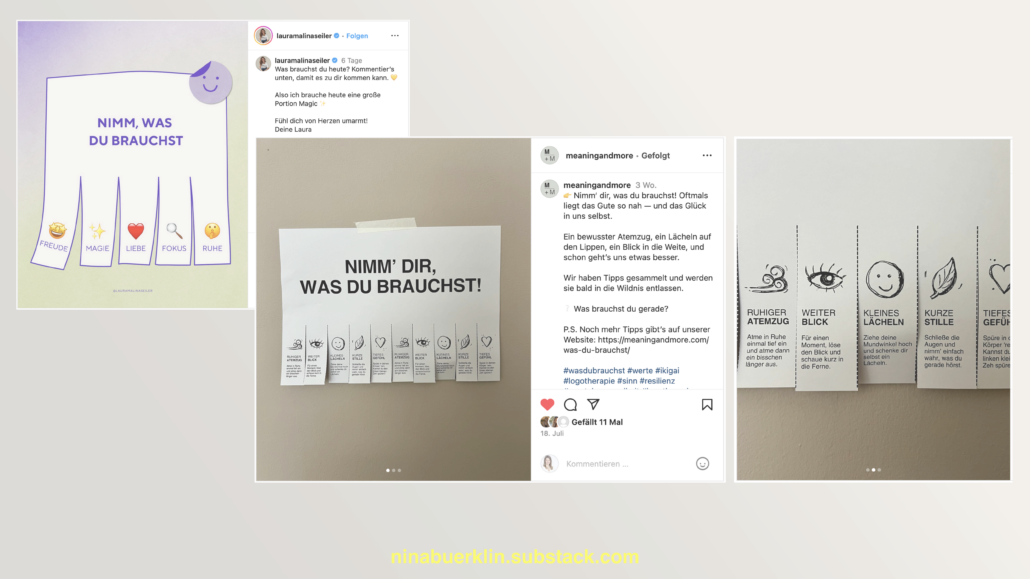Selbstverwirklichung? Ist nicht das Ziel!
Selbstverwirklichung… Klingt verlockend, nicht wahr?
Ein kleines Stück Erleuchtung hier, ein bisschen Persönlichkeitsentwicklung da, und voilà – du bist die beste Version deiner selbst!
Doch halt mal kurz: Vielleicht ist diese ewige Jagd nach „Selbstverwirklichung“ ja gar nicht das Ziel. Viktor Frankl, Psychiater und Holocaust-Überlebender, hätte darüber wohl nur müde gelächelt. In einem seiner letzten Interviews schüttelte er den Kopf über den Selbstoptimierungswahn (auch wenn er das damals nicht so genannte hätte).
Frankl sagt: „Es geht um mehr.“
Mehr als nur das Streben nach der perfekten Version von dir selbst. Mehr als noch höher, schneller, weiter. Aber um was genau geht’s dann?
Die kurze Antwort: Werteverwirklichung.
Die lange Antwort: findest du unten stehend. Den Link zum Interview (Video) auch.
Im Fokus: der Wille zum Sinn
Die Logotherapie, als eine unter anderen Psychotherapien, ist sozusagen eine „sinnzentrierte“ Psychotherapie, und zwar insofern, als die Logotherapie den Menschen nicht in erster Linie als vom Willen zum Vergnügen bestimmt, um nicht zu sagen dominiert, sieht, auch nicht vom Willen zur Macht im Sinne der Adlerschen Lehre, sondern grundsätzlich vom Willen zum Sinn. – Viktor Frankl
Was motiviert uns wirklich? Frankls überraschende Antworten
Der Wille nach Sinn ist grundlegend
Viktor Frankl betont, dass das Streben nach Sinn die primäre Motivation des Menschen ist. Sinn im Leben zu haben trägt wesentlich zum Überleben und zum allgemeinen Wohlbefinden bei. Selbstverwirklichung ist nur ein „Nebenprodukt“, niemals das Ziel.
Drei Kategorien von Werten als Quellen für Sinn
Werte sind Möglichkeiten zur Sinnverwirklichung. Frankl kategorisiert hierbei drei Arten von Werten: schöpferische Werte, bei denen es darum geht, im Tun einen Sinn zu erleben; Erlebniswerte, bei denen das Erleben von etwas oder jemandem Sinn geben kann; und Einstellungswerte, die sich auf die Wahl der eigenen Reaktion auf Leiden konzentrieren.
Zentral dabei ist, dass wir Menschen uns nie nur auf einen einzelnen Wert fokussieren sollten (logotherapeutisch spricht man hier von pyramidaler Werteorientierung). Vielmehr sollten wir danach streben, verschiedene Werte in unserem Leben zu kultivieren (logotherapeutisch: paralelle Werteorientierung). Wenn dann mal ein Wert, also eine Quelle von Sinn, wegfällt, haben wir immer noch andere Säulen im Leben, auf die wir bauen können.
Die Macht der Einstellung und Entscheidung
Frankl betont die Bedeutung der Wahl der eigenen Einstellung, insbesondere in herausfordernden Situationen. Er weist darauf hin, dass der Einzelne auch dann, wenn er mit Leid oder Tod konfrontiert wird, entscheiden kann, wie er reagiert und in seiner Herangehensweise an die Umstände, denen er begegnet, einen Sinn finden kann. Wir können nicht immer die äußeren Umstände beeinflussen, aber wir haben immer die geistige Freiheit, uns zu ihnen einzustellen.
Logotherapie als sinnzentrierte Psychotherapie
In dem Interview stellt Frankl die Logotherapie als einen psychotherapeutischen Ansatz vor, der einen starken Fokus auf die Entdeckung und Erfüllung des Sinns im Leben legt. Sie steht im Gegensatz zu deterministischen und instinktgetriebenen Theorien, indem sie den Willen zum Sinn als Kernmotivation des Menschen hervorhebt. Im Kern steht das Menschenbild, das eine Person als frei und verantwortlich ansieht.
Innere Leere als Ausdruck von Sinnlosigkeit
Immer wieder erleben Menschen eine starke innere Leere, die mit Apathie, Langeweile und Interessenverlust einhergeht. Anstatt einen Wettbewerb zu entfachen, wem es schlechter geht, ruft Frankl dazu auf, Mitgefühl für diejenigen aufzubringen, denen es nicht gut geht und sie zu unterstützen
Sie sehen gerade einen Platzhalterinhalt von YouTube. Um auf den eigentlichen Inhalt zuzugreifen, klicken Sie auf die Schaltfläche unten. Bitte beachten Sie, dass dabei Daten an Drittanbieter weitergegeben werden.
Wie Viktor Frankls Sicht auf Sinn und Selbstverwirklichung unser Weltbild verändern kann
Zu Beginn dieses Interviews fragt der Moderator Viktor Frankl nach einem Zitat von Nietzsche: „Wer ein Warum zum Leben hat, erträgt fast jedes Wie“. Es gilt als einer der wichtigen Leitsatz des österreichschen Psychiaters und Holocaust-Überlebenden. Frankl erklärt, dass es überlebenswichtig sei, einen Sinn im Leben zu haben. Er ist überzeugt davon, dass der Wille zum Sinn die primäre Motivation des Menschen ist, ganz im Gegensatz zu deterministischen und instinktgetriebenen Theorien.
Frankl stellt die Logotherapie als einen psychotherapeutischen Ansatz vor, bei dem die Suche nach Sinn im Mittelpunkt steht. Selbstverwirklichung ist nur ein Nebenprodukt, niemals das Ziel.
Die Diskussion zwischen Frankl und dem Moderator verlagert sich auf die Erfahrung der inneren Leere und die Unterschiede zwischen europäischen und amerikanischen Studierenden. Unabhängig davon, wer nun schwerer betroffen sei, betont Frankl die Bedeutung von Mitgefühl und der Unterstützung derjenigen, denen der Sinn für Sinn fehlt. Es gehe nicht darum, einen Wettbewerb zu entfachen, wem es schlechter geht, sondern darum, für Unterstützung zu sorgen.
(…) der Mann auf der Straße oder die Frau auf der Straße kann Tag für Tag einen Sinn darin finden, eine Tat zu vollbringen, ein Werk zu schaffen und – das ist das Kreative – kreativ zu sein und etwas zu erleben. Die Schönheit. Die Wahrheit als Forscher, oder das Gute im Umgang mit Menschen als Lehrer oder was auch immer. – Viktor Frankl
Zentral im Ansatz der Logotherapie sind Werte als Möglichkeiten zur Sinnverwirklichung. Frankl kategorisiert Werte in drei Arten: schöpferische, Erlebnis- und Einstellungswerte. Die schöpferischen Werte beziehen sich auf das aktive Tun einer Person, bspw. bei einem Projekt auf der Arbeit. Bei den Erfahrungswerten geht es darum, einen Sinn darin zu finden, etwas oder jemanden zu erleben, etwa einen Sonnenuntergang zu genießen oder die Einzigartigkeit eines Individuums zu erkennen. Einstellungswerte konzentrieren sich auf die Wahl der eigenen Reaktion auf Leiden – und zwar immer dann, wenn die Verwirklichung von schöpferischen und Erlebniswerten nicht (mehr) möglich ist.
Frankl erzählt von seinen Erlebnissen in einem der vier Konzentrationslager, die er überlebte, wo er und andere Gefangenen Trost in der Schönheit eines Sonnenuntergangs fanden. Er stellt fest, dass man selbst im Angesicht des Todes seine Haltung bewusst wählen und einen Sinn finden kann. Frankl schließt mit der Erklärung, dass die Vergangenheit eine Bedeutung hat, da alles, was man getan oder erlebt hat, ob positiv oder negativ, für immer erhalten bleibt und nicht rückgängig gemacht werden kann. Die Vergangenheit ist wie eine große Scheune, in der alle Handlungen eines Menschen gespeichert sind, sie sind unumkehrbar geschehen.
Dies ist ein Paradigma für Erfahrungswerte, für die Suche nach einem Sinn im Erleben, ohne etwas zu tun, ohne etwas zu erreichen oder zu vollbringen, sondern einfach dadurch, dass man die unmittelbare Erfahrung macht, dass etwas Schönes in der Welt vor sich geht. – Viktor Frankl
Sinn statt Selbstverwirklichung: Wie die drei Wertekategorien unser Leben bereichern
Es ist verlockend, Selbstverwirklichung als das ultimative Ziel zu betrachten, doch Viktor Frankl zeigt uns, dass es sich lohnen kann, die Suche nach Sinn auf andere Weise zu gestalten.
Ein effektiver Ansatz ist es, sich auf die Verwirklichung der drei Wertekategorien zu konzentrieren, die Frankl beschreibt: schöpferische Werte, Erlebniswerte und Einstellungswerte.
- Kreative Auszeiten planen ist eine hervorragende Möglichkeit, schöpferische Werte zu leben. Wenn wir regelmäßig Zeit für kreative Projekte oder Hobbys einplanen, erleben wir direkte Erfüllung und Sinn durch unser Tun. Diese Momente der Kreativität bieten uns nicht nur eine Flucht aus dem Alltag, sondern auch eine tiefere Verbindung zu unseren eigenen Werten und Fähigkeiten.
- Erlebniswerte verwirklichen bedeutet, bewusst Zeit für die Erlebnisse einzuplanen, die uns Freude und Staunen bringen. Ob ein entspannender Spaziergang in der Natur, ein Besuch im Museum oder ein geselliges Treffen mit Freunden – solche Erlebnisse bereichern unser Leben und stärken unsere Fähigkeit, die Schönheit und Tiefe des Moments zu erleben.
- Schließlich können wir durch die sinnvolle Reaktion auf Herausforderungen die Einstellungswerte verwirklichen. In schwierigen Situationen bewusst eine positive Haltung zu wählen und nach einem Lern- oder Wachstumspotenzial zu suchen, ermöglicht es uns, auch in widrigen Umständen einen Sinn zu finden. Die Frage Wozu? (im Gegensatz zu Warum?) kann hier Wunder wirken.
Wann startest du durch?
Mit welchen Werten fängst du an?









